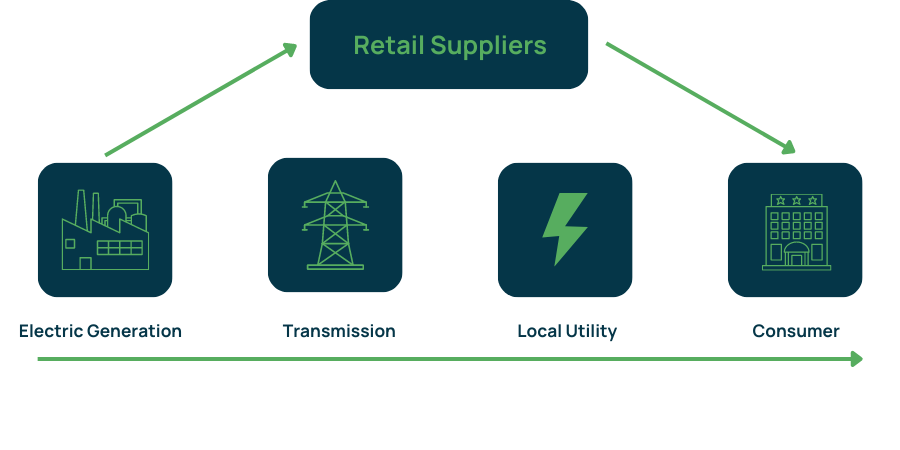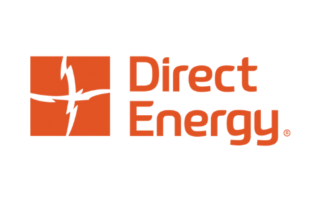Whether you are a customer located in a deregulated energy state, an energy broker looking to expand, or are simply curious about the retail energy markets, retail energy suppliers are an integral part of the energy industry. These companies act as power and natural gas marketers by purchasing energy from the wholesale market and reselling it to retail customers. This article aims to outline the key aspects of a retail energy provider and its function in the energy market.
What Are Retail Energy Suppliers?
Retail energy suppliers exist in deregulated energy markets and are involved in the reselling of energy from the wholesale markets to end-use consumers. In deregulated states, retail energy suppliers are many times referred to as providers or competitive, third-party suppliers, and are required to get licensed.
Retail energy suppliers play an important role in the energy economy. In fact, some of the largest energy companies in the world operate as retail energy suppliers. These companies can own electricity generation plants and are also involved in the national sale of electricity and natural gas. In most states, retail suppliers must become members of the local grid operator in order to begin scheduling and supplying power to customers. Many times these suppliers utilize an energy wholesale counterparty that helps them to hedge costs in the energy futures markets. Some of the nation’s largest energy suppliers have their own wholesale divisions that take on the responsibility of managing their energy costs and purchasing energy from the wholesale market.
In the U.S. retail energy suppliers must also comply with FERC federal regulations and become members of electric grids where they plan to sell energy. Many times, retail suppliers will subcontract sales efforts to energy brokers who acquire customers on their behalf.
Do Retailers Own Utility Lines?
No. Retail energy providers are simply involved in the sale of energy in the retail markets and do not own utility lines. Local power lines are owned by utility companies that are responsible for maintenance, delivery, and billing. Retail suppliers can, however, own generation plants and many large suppliers own their own power generation. Here is a look at the electricity supply chain:

When looking at the history of energy deregulation in the U.S., you might notice that many utility companies acted as their own energy suppliers prior to the markets becoming deregulated. In fact, even today in regulated markets, utility companies own generation plants, transmit power over high-tension lines, and sell energy to their customers.
The big difference between retail energy providers and utility companies is seen in deregulated markets. In these states, utility companies are not even permitted to earn profits from the sale of energy supply. Energy suppliers are solely responsible for generating and selling energy to customers in these states, where the utility company’s function is to merely distribute energy and maintain local delivery networks, such as power and gas lines.
The 25 Largest Retail Energy Suppliers In The U.S.
The retail energy market is a trillion-dollar industry. And, many retail energy suppliers also participate in the generation of electricity in deregulated states, making them very large energy companies. For example, the regulated utilities of PECO, COMED, Delmarva, Pepco, Atlantic City Electric, and BGE are all owned by Exelon, a retail energy company. Up until February of 2022, Exelon owned over 35,000 megawatts of electricity generating plants through its other subsidiary, Constellation Energy, one of the nation’s largest retail electric suppliers. Constellation Energy was spun off of Exelon in 2022 and now operates as an independent company. Here is a list of the largest retail energy suppliers in the country today by annual revenue (source compiled from EIA retail power marketer sales):
| Retail Supplier | Customer Count | Sales (MWh) | Revenue (Thousands) |
|---|---|---|---|
| Constellation | 1,415,543 | 108,222,800 | $6,847,301.70 |
| Direct Energy Business | 671,381 | 46,901,721 | $3,275,945.40 |
| ENGIE | 64,909 | 26,356,328 | $1,743,644.90 |
| Calpine Energy Solutions, LLC | 970 | 25,260,165 | $1,629,987.10 |
| AEP Energy | 484,284 | 25,274,975 | $1,428,759.70 |
| Dynegy Energy Services, LLC | 680,062 | 21,240,514 | $1,160,160.40 |
| Energy Harbor Corp. | 816,886 | 21,077,323 | $1,008,387.20 |
| EDF Energy Services, LLC | 1,065 | 15,854,312 | $955,165.90 |
| WGL Energy Services, Inc. | 90,760 | 11,795,369 | $647,714.20 |
| Reliant Energy Northeast LLC | 480,800 | 7,100,680 | $630,548.00 |
| Interstate Gas Supply, Inc. | 326,913 | 9,747,154 | $574,964.20 |
| Talen Energy Marketing, LLC | 1,286 | 9,413,049 | $527,094.00 |
| Homefield Energy | 457,236 | 8,296,619 | $379,310.00 |
| Shell Energy North America | 154 | 8,582,373 | $369,644.30 |
| NextEra Energy Services, LLC | 99,411 | 4,679,561 | $343,667.90 |
| Hudson Energy Services | 34,903 | 4,125,425 | $314,694.00 |
| Champion Energy Services | 9,368 | 5,292,859 | $282,310.60 |
| MidAmerican Energy Services | 18,914 | 4,280,733 | $247,428.40 |
| Ambit Energy Holdings, LLC | 299,395 | 3,228,434 | $244,220.00 |
| Inspire Energy Holdings, LLC | 233,857 | 2,197,425 | $225,241.10 |
| MP2 Energy LLC | 9,467 | 3,953,642 | $219,692.30 |
| Freepoint Energy Solutions | 6,376 | 4,103,827 | $216,928.00 |
| Agressive Energy LLC | 9,023 | 2,282,402 | $173,947.50 |
| CleanChoice Energy, Inc. | 170,182 | 1,321,845 | $172,720.50 |
| Texas Retail Energy, LLC | 1,280 | 2,833,378 | $159,776.00 |
Working With Retail Energy Suppliers.
Whether you are an energy broker looking for a low electricity rate for your clients or an end user trying to save money on your utility bill, negotiating with retail energy suppliers is a must in order to better manage energy costs. As you can see from the list above, there are many retail energy providers to choose from, and not all suppliers are created equal. Some suppliers service thousands of small customers and their revenue per customer is quite low, while others only service a handful of larger customers. It’s best to work with an energy broker to evaluate your energy usage and find the right energy supplier to work with in order to maximize your benefits. Larger companies can potentially get better service from suppliers that focus on serving large energy loads, while small businesses might benefit from low fixed rates offered by mass-market energy providers.
Need Help Choosing An Energy Supplier?
Our team of retail energy market professionals has decades of experience working with energy suppliers and knowing the right supplier that can meet your specific energy needs. Contact our team today to start the process of evaluating energy suppliers for your next retail energy contract. We work with the nation’s leading retail energy suppliers, including:






















